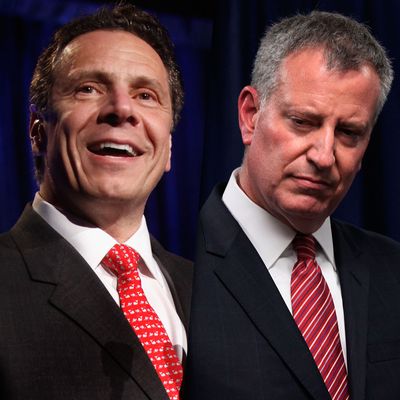
It took Governor Andrew Cuomo one whole week to strike back after being ripped by Mayor Bill de Blasio. And when he did it Tuesday afternoon, Cuomo inserted the knife slyly. “I understand why he’s frustrated. I get frustrated, but we have a situation in Albany where you don’t always get everything you want. That’s called life,” the governor said. “It’s clear that his style is to air his public frustration. Everybody has their own style, I don’t choose to do that. I try to bite my tongue once in a while on personal feelings.”
Strictly business. Not personal. Not like the anonymous Cuomo administration official who called de Blasio “bumbling and incompetent” in The Wall Street Journal. So, hey, that’s an improvement.
Last Tuesday the mayor had done a remarkable and risky thing, going on NY1 to deliver a frontal assault on Cuomo for “inhibiting” de Blasio’s state legislative agenda, particularly on affordable housing. “He engaged in his own sense of strategies, his own political machinations, and what we’ve often seen is, if someone disagrees with him openly, some kind of revenge or vendetta follows,” de Blasio told Errol Louis.
Just in case anyone wasn’t clear on how the mayor felt, he invited reporters into his City Hall office to amplify the attack. “There is a kind of deal-making and horse-trading that he engages in that I think often obscures the truth. It gets so convoluted — I’m not sure even the people around him begin to remember where they began.”
The cheering from liberal activists who hate the governor, and from Democrats who’ve been on the receiving end of his pettiness, had to be heartening. And every politician deserves praise from the press for saying what he or she really thinks.
Still, you’ve got to wonder: What does de Blasio gain by blasting Cuomo?
For 18 or so months, de Blasio had followed a rope-a-dope doctrine. He had been willing to take punches from Cuomo to win state funding for his marquee pre-kindergarten and after-school programs. But the upstagings and rank-pullings kept coming — from Cuomo’s blindsiding of de Blasio with an Ebola quarantine to a last-minute request for $1 billion more in city transit funding to sudden inspections of city homeless shelters — and the rewards kept diminishing.
Two things galled de Blasio the most this spring. There was Cuomo’s inability — or unwillingness — to get mayoral control of the schools renewed for more than one year. Nearly as infuriating, though, was being painted as the loser in Albany’s legislative session even as the substance on one big policy issue — the 421-a program to subsidize below-market housing construction — was still in play, with the specifics ultimately turning out pretty favorably for de Blasio.
The mayor’s tirade, however, was born as much of calculation as principled frustration. He doesn’t think there’s anything to be gained in Albany anymore from playing nice with the governor; there are, however, points to be scored in the city by appearing strong in standing up to Cuomo.
De Blasio is probably right on the first half of that analysis: “I understand why you guys in the city pay so much attention to him,” a state capitol insider told me months ago, “but people in Albany really don’t care much about the mayor, whoever he is.” So the sausage usually gets made according to Albany’s insular needs and logic — which was already going to work against de Blasio in 2016, an election year, and will probably be even more set against the mayor after his tirade.
Closer to home, de Blasio thrilled his progressive base, and the mayor’s camp believes he has seized the moral high ground against Cuomo. Which is a good thing, in theory. But by escalating the feud de Blasio also risks making his pissing match with Cuomo the entire narrative; the mayor will need to avoid coming across as a whiner who cries “There he goes again!” every time Cuomo does something de Blasio doesn’t like.
De Blasio may be smart to tap into the general disgust with state government, but his outburst also displayed the mayor’s penchant for sanctimony. “I’m not going to be surprised if these statements lead to attempts at revenge, and we’ll just call them right out, because we’re just not going to play that way,” de Blasio said at City Hall. “We’re not going to accept that as anything like acceptable government practice.”
So the mayor is switching from rope-a-dope to playground bully theory: that the last thing Cuomo really wants is a one-on-one challenge. There is also, in the mayor’s orbit, an almost-pained feeling that Cuomo seems bent on isolating himself politically when he could be partnering with de Blasio. In that context, the mayor’s comments can be read as a strange form of political tough love. For now, though, the healthiest result of this clash — for both men, if not for the city and the state — is that they can finally stop pretending to be friends.





























